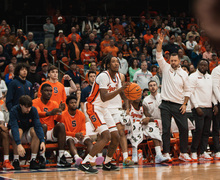Access Mentoring aims to create meaningful experiences for all SU students
Francis Tang | Asst. News Editor
The current mentors hope to see more students join the meetings to learn and hear stories of the community of people with disabilities.
Get the latest Syracuse news delivered right to your inbox.
Subscribe to our newsletter here.
UPDATED: April 11, 2022 at 9:30 p.m.
The Access Mentoring Program, a group open to all undergraduate students with disabilities, defines itself as a center helping to coordinate different campus-wide activities for the university’s students, faculty, staff and people in the community.
Disability Cultural Center Coordinator Kate Corbett Pollack and Interim Director Huey Hsiao run the program, which includes peer mentors and mentees.
Syracuse University’s Disability Cultural Center is housed with the LGBTQ Resource Center in the Intercultural Collective. The center offers several resources and events for people who identify as individuals with disabilities.
Peer mentor Diana Garcia-Varo, a third-year art video and psychology major, joined the program as an access mentor in her freshman year. The Disability Cultural Center provides a welcoming space for all students at any time, she said.
Garcia-Varo said the program aims to help the mentees navigate the available resources on campus, create structure and enhance their journeys at SU.
“I decided to work as an access mentor because the Disability Cultural Center aims to help disabled students navigate resources on campus and promote disability culture,” Garcia-Varo said.
Danielle Burden, a junior and a current mentee in the program, described her relationship with the mentors as light-hearted. Burden said the program is accessible for her and that Pollack and other mentors have helped her engage and connect to campus life.
“We have a good relationship; we talk about things. I don’t feel like a mentor-mentee relationship, but more like friends,” Burden said. “It’s good to sit down and have conversations with them.”
The free group meetings of the Access Mentoring Program take place every two weeks. The group’s topics of discussion include accessibility and diversity, Garcia-Varo said.
Alison Gilmore, a sophomore studying sport analytics, said advocacy and sharing are important to her. Gilmore joined the program as a mentor this semester.
“Just connecting advocacy and sharing my story and hearing from others, that helps me to connect with the disabled population on campus, and I’m really grateful for that,” Gilmore said. “I wasn’t engaged too much with the disabled community before — it’s something I always wanted to do.”
Gilmore wants to let more students learn about the disability culture by joining the Access Mentoring Program’s info sessions.
“Even if you don’t identify with a disability, it’s something that a lot of students can learn from,” Gilmore said. “If you come and listen to us, and just be able to learn and hear our experiences, I think it’s a great opportunity. Not only for a community for disabled students, but also to create a community for that further understanding for non-disabled students, so it’s just a great learning experience.”
Garcia-Varo said the program needs more participation to better support those in need. The current mentors hope to see more students join the meetings to learn and hear stories of the community of people with disabilities.
“We need more people; we need more mentors. The more mentors we have, the more encouragement it’s going to give students on campus, to know they can be supported,” Garcia-Varo said. “If people want to connect, they can always feel free to do so, because that’s what we want. We want to hear from everyone on campus.”
CORRECTION: In a previous version of this post, Alison Gilmore’s major and Danielle Burden’s class standing were misstated. The Daily Orange regrets these errors.
Published on April 11, 2022 at 1:13 am
Contact Viola: hwai01@syr.edu






